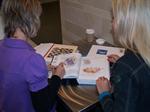Study Nutrition, Sports, Nutrition, Food and Beverage Management.
 Learn about food supply, service and human nutrition.
Learn about food supply, service and human nutrition. - Graduates can obtain professional indemnity insurance through Tower Insurance.
Course Structure and Content
The course is made up of the following fifteen 100 hour long modules:
Nutrition I

There are nine lessons in this course, each requiring about 10 hours work by the student. Emphasis is placed on understanding the body, the food we eat & it's affects, our mental, emotional health (state of mind), and physical health.
The nine lessons are as follows:
- Introduction to Nutrition
- The Digestive System
- Absorption and Enzymes
- Energy Value and Foods
- Carbohydrates and Fats
- Proteins
- Vitamins and Minerals
- Water
- Nutrient Disorders
Nutrition II
This course is divided into eight lessons as follows:.
- Cooking And Its Effect On Nutrition
- Food Processing And Its Effect On Nutrition
- Recommended Daily Intake Of Nutrients
- Vitamins
- Minerals
- Planning A Balanced Diet
- Assessing Nutritional Status and Needs
- Timing Of Meals and Needs For Special Groups
Nutrition III
This course is divided into eight lessons as follows:.
- Problems With Eating
- Dental Problems
- Fibre and Bowel Diseases
- Different Ways of Eating
- Food Toxicity A
- Food Toxicity B
- Detoxification/Body Cleansing
- Consulting/Giving Advice
Food and Beverage Management
This has nine lessons as follows
- Human Nutrition
- Cooking
- Kitchen and Food Management
- Planning a menu
- Alcoholic Beverages
- Tea, Coffee and non alcoholic Beverages
- Scope and Nature of Catering Services
- Personnel Management, waiter/waitress skills, restaurant staffing, kitchen staff, etc.
- Managing Catering Servicing
Sports Nutrition
There are 9 lessons as follows:
- Introduction to Human and Sports Nutrition
- Energy
- Energy in the Athlete’s Body
- The Training Diet
- The Competition Diet
- Fluids
- The Athlete’s Body Composition
- Weight Management
- Training for Size and the Use of Sports Supplements
Children's Nutrition
There are 10 lessons in this module as follows:
- Introduction to Child Nutrition
- Nutrition for Pre-Pregnancy
- Nutrition in Pregnancy
- Nutrition in Infants
- Nutrition in Childhood
- Nutritional Concerns
- Healthy Eating Behaviours
- Issues in Child Nutrition
- Childhood Obesity
- Diet Plans
Human Biology 1A
There are 6 lessons as follows:
- Cells and Tissues - Explains the human body at a microscopic level, including the structure and function of cells, tissues and membranes.
- The Skeleton - Examines features of the human skeletal system.
- The Muscular System -Describes the human muscular system, in terms of structure and basic function.
- The Nervous System – Looks at the human nervous system, in terms of structure and basic functions.
- Digestion and Excretion -Explains different physiological systems of digestion and excretion in the body.
- Physiological Systems –Focuses on the different physiological systems of the body.
Human Biology II
There are 8 lessons as follows:
- How Nerves Work - how nerves cause reactions in the human body.
- Nerves and Motor Skills - how the nervous system affects motor skill performance.
- Skeletal Muscle - function and structure of skeletal muscle in the human body.
- Muscle Organisation - organisation of muscle tissue in the human body.
- Muscular Movement - mechanics of muscular movement.
- Muscular Development - development of muscular strength and muscular endurance.
- Muscle Flexibility - selecting muscular flexibility exercises.
- Muscles and Posture - significance of muscles to posture and general well being.
Human Biology III
There are 7 lessons as follows:
- The Science of Blood
- Blood Pressure
- Pulmonary Ventilation
- Gas Exchange and Transport
- Blood Flow and Gas Transport
- Cardio Respiratory Control
- Cardio Respiratory Disease
Research Project I
There are 7 lessons as follows:
- Determining Research Needs
- Searching For Information
- Research Methods
- Using Statistics
- Conducting Statistical Research
- Research Reports
- Reporting On A Research Project
Research Project II
There are 6 lessons in this module as follows:
- Identifying research issues
- Acquisition of technical information
- Specialised research techniques
- Research planning and designing
- Statistics
- Conducting research
Biochemistry I (Animals)
There are 10 lessons as follows:
- Introduction to biochemistry
- Lipids and proteins
- Enzymes and hormones
- Nucleic acids
- Thermo-regulation
- Carbohydrate metabolism
- Absorption
- Acidity and alkalinity
- Chemical analysis
- Biochemical applications
100 hours of industry meetings
PLUS two other 'relevant' modules of the student’s choice, for example, any two of the following:
Graduate Opportunities in the Industry
What we eat has a huge impact on our health, and nutritional counsellors help advise and guide people to eat a balanced diet to maintain good health. If you are interested in food, nutrition and health, and enjoy communicating with people, this may be the career path for you.
Nutritional counsellors or nutritionists may educate others on health and the establishment of a well-balanced diet.
Nutritional counselling and advice may help others identify their problems with food, and the physical consequences of not eating well.
Education about the nutritional values of food can be of particular benefit to a person with physical problems, and can complement the medical treatment that person is receiving from a medical practitioner.
Nutrition professionals may work in development of foods, teaching about food, or advising people on what they eat. They may or may not work in conjunction with other professionals.
A nutritional counsellor’s role may include:
- understanding nutritional science – the role and benefits of particular vitamins and minerals;
- interpreting nutrition science – explain what a client needs to take to address a nutritional issue;
- assessing people's nutritional needs;
- advising on nutrition and diet for general good health and well being or for special needs such as sport;
- implementing nutrition services and programs;
- teaching others about better health and well being.
Opportunities
Employment in the field of Nutrition is varied. You may work for yourself and counsel clients how to eat more healthily to have more personal well-being. You can work with clients or you can work as a nutritional journalist. These are just a couple of the many avenues that you can explore. Employment in this field can be part time, full time, casual or permanent.
Depending on where you are living, career opportunities can be quite different – of course, a larger city provides more opportunities in general. A background in Nutrition can be utilized in many different industries at a variety of levels. Other qualifications and certificates may be beneficial to secure positions at management or higher levels.
Remuneration and advancement opportunities depend on where and how you are practising in this field. If you are counselling in nutrition, the price for one half hour session may vary from not much more than the minimum wage to over four times that rate. This may depend greatly on whether you are working in your own practice and location, and your specialities.
Extra study in a specialised area will make your skills more competitive. After some time in the business, many nutritionists decide to specialise in fields such as weight loss, fertility, childhood – especially ADD and Autism, sports such as performance and weight lifting. Or you can simply become a specialist vegan nutrition counsellor, making sure that those people not eating meat, fish, or other animal products get the right amount of nourishment and vitamins. If you are working on your own, advancement will depend on you and what you want to add to your skills. If working for others, it will depend on what industry they are in and what they find beneficial.
What Next?
Register to Study - Go to “It’s Easy to Enrol” box at the top of the page and you can enrol now.
or
Get Advice – If you have any questions or want to know more, phone us on (UK) 01384 442752 (International - +44 (0) 1384 442752) or connect with our specialist tutors using our FREE COUNSELLING SERVICE.